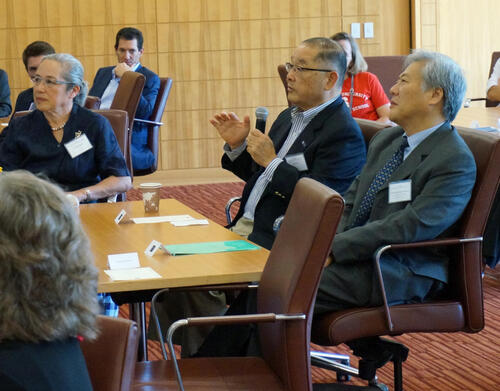Michael McFaul, a Stanford political scientist and former U.S. ambassador to Russia, has been selected as the next director of the universityŌĆÖs Freeman Spogli Institute for International Studies.
The announcement was made Wednesday by Stanford Provost John Etchemendy and Ann Arvin, the universityŌĆÖs vice provost and dean of research. McFaul will succeed Mariano-Florentino Cu├®llar, who was nominated in July as an associate justice of the California Supreme Court and elected Tuesday.
McFaul takes the helm of FSI in January.
"Stanford has long been a home for scholars who connect academia to policy and public service, and Professor McFaul is the embodiment of that model," Etchemendy said. "We are grateful for Mike's service and confident he will be a strong leader for FSI."
Arvin said McFaul is a strong fit for the position.
ŌĆ£Professor McFaulŌĆÖs background as an outstanding scholar and his service as an influential ambassador give him a vital perspective to lead FSI, which is StanfordŌĆÖs hub for studying and understanding international policy issues,ŌĆØ she said. ŌĆ£His scholarship, experience and energy will keep FSI and Stanford at the forefront of international studies as well as some of the most pressing global policy debates."
McFaul has been a faculty member in the department of political science at Stanford since 1994. He joined the Obama administration in January 2009, serving for three years as Special Assistant to the President and Senior Director for Russian and Eurasian Affairs at the National Security Council at the White House. He then served as U.S. Ambassador to the Russian Federation from 2012 to 2014.
McFaul already has a deep affiliation with FSI. Before joining the government, he served as FSI deputy director from 2006 to 2009. He also directed FSIŌĆÖs Center on Democracy, Development, and the Rule of Law (CDDRL) from 2005 to 2009.
During his four years leading CDDRL, McFaul launched the Draper Hills Summer Fellowship program for mid-career lawyers, politicians, advocates and business leaders working to shore up democratic institutions in their home countries. He also established CDDRLŌĆÖs senior honors program. From 1992-1994, McFaul also worked as a Senior Research Fellow at FSIŌĆÖs Center for International Security and Cooperation (CISAC).
ŌĆ£I am thrilled to be assuming a leadership role again at FSI,ŌĆØ McFaul said. ŌĆ£FSI has become one of the premier institutions in the country for policy-relevant research on international affairs. I look forward to using my recent government experience to deepen further FSIŌĆÖs impact on policy debates in Washington and around the world.ŌĆØ
Arvin said McFaulŌĆÖs previous positions at FSI and CDDRL will make for a smooth transition in the instituteŌĆÖs leadership.
ŌĆ£His familiarity with FSIŌĆÖs history and infrastructure will allow him to start this new position with an immediate focus on the instituteŌĆÖs academic mission,ŌĆØ she said.
McFaul is also the Peter and Helen Bing Senior Fellow at the Hoover Institution, and plans to build on his long affiliations with both Hoover and FSI to deepen cooperation between these two premier public policy institutions on campus.
He has written and co-authored dozens of books including Advancing Democracy Abroad: Why We Should, How We Can; Transitions To Democracy: A Comparative Perspective (with Kathryn Stoner); Power and Purpose: American Policy toward Russia after the Cold War (with James Goldgeier); and RussiaŌĆÖs Unfinished Revolution: Political Change from Gorbachev to Putin.
ŌĆ£In so many ways, Mike represents the best of FSI,ŌĆØ said Cu├®llar, who has held leadership positions at FSI since 2004 and begins his term on the California Supreme Court in January. ŌĆ£He knows the worlds of academia and policy extremely well, and will bring unique experience and sound judgment to his new role at FSI.ŌĆØ
McFaul currently serves as a news analyst for NBC News, appearing frequently on NBC, MSNBC, and CNBC as a commentator on international affairs. He also appears frequently on The Charlie Rose Show and The Newshour, as well as PBS and BBC radio programs. He has recently published essays in Foreign Affairs, The New York Times, Politico, and Time.
McFaul was one of the first U.S. ambassadors to actively use social media for public diplomacy. He still maintains an active presence on Facebook at amb.mcfaul and on Twitter at @McFaul.
McFaul received his B.A. in International Relations and Slavic Languages and his M.A. in Russian and East European Studies from 91│į╣Ž in 1986. As a Rhodes Scholar, he completed his D. Phil. in International Relations at Oxford University in 1991.
ŌĆ£Since coming here in 1981 as 17-year-old kid from Montana, Stanford has provided me with tremendous opportunities to grow as a student, scholar, and policymaker,ŌĆØ McFaul said. ŌĆ£I now look forward to giving back to Stanford by contributing to the development of one of the most vital and innovative institutions on campus.ŌĆØ

 FSI researchers strive to understand how countries relate to one another, and what policies are needed to achieve global stability and prosperity. International relations experts focus on the challenging U.S.-Russian relationship, the alliance between the U.S. and Japan and the limitations of AmericaŌĆÖs counterinsurgency strategy in Afghanistan.
FSI researchers strive to understand how countries relate to one another, and what policies are needed to achieve global stability and prosperity. International relations experts focus on the challenging U.S.-Russian relationship, the alliance between the U.S. and Japan and the limitations of AmericaŌĆÖs counterinsurgency strategy in Afghanistan.